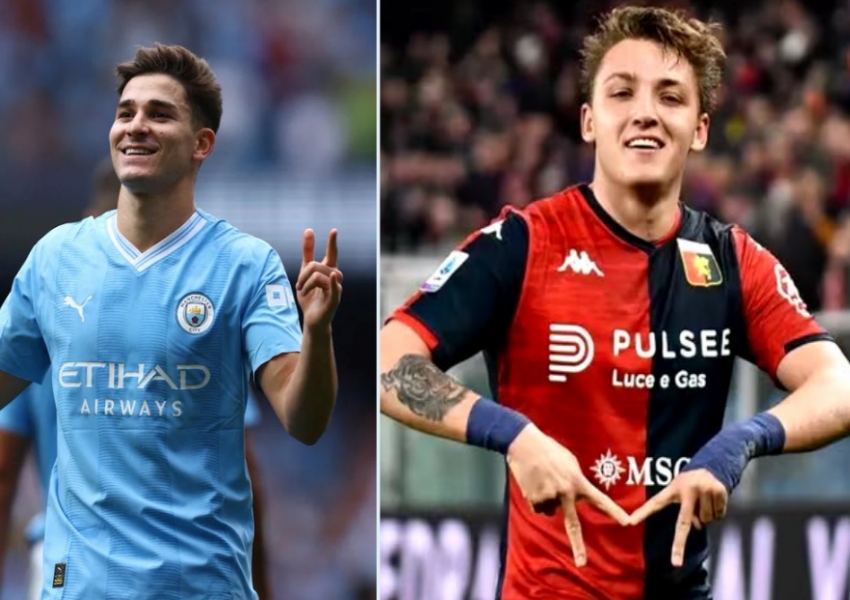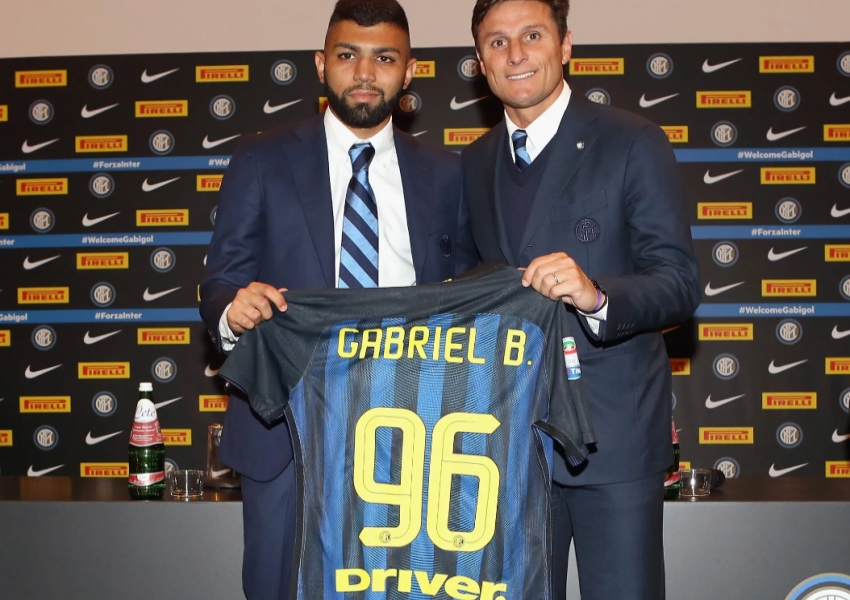Key Executive Explains Why Inter Milan Abandoned Early Chinese Investment Strategy: Spider Alvarez Controversy and the Unavoidable South America Shift
Inter Milan's prominent executive, Dario Baccin, known as the "King's Right Hand" by the Curva Nord—where "King" refers to the Serie A transfer king Beppe Marotta, with Ausilio and Baccin being his right and left hands responsible for actual operations—recently gave an exclusive interview to Sky Italia. In this interview, Baccin covered numerous topics, one of which sparked considerable debate: the gradual move away from South American talent acquisition, which has led to a current squad full of hard-working "soldiers" but lacking in technical finesse.

In the early years of Chinese ownership, Inter heavily invested in South American players. At that time, major newspapers reported that Suning's acquisition of Gabriel Barbosa, also known as Gabigol, was a mistake influenced by Kia Joorabchian. While this evaluation might hold when looking at individual transactions, a broader perspective reveals a more strategic approach. Over the first three years of Chinese ownership, Inter spent substantial sums on players from South America, such as Lautaro Martinez (Racing Club), Colidio (€9.5 million from Boca Juniors), and Brazao (€6.3 million, initially transferred to Parma, then to Cruzeiro). Gabigol was merely emblematic of this broader strategy. The key figure behind these moves was Baccin, and the success of Lautaro Martinez validates this approach. While many South American signings didn’t pan out, Lautaro's success highlights the importance of volume and scale in increasing the chances of hitting the jackpot—an inherent gamble in scouting.

Initially, Suning's declared goals for Inter were "localization and rejuvenation." The former led to a largely Italian CEO, managerial, and coaching staff, along with a surge in domestic players. The latter emphasized youth, with South American scouting playing a significant role. However, in recent years, Inter has gradually abandoned this strategy. Now, when Inter scouts for new talent, they tend to look towards smaller European leagues or lower-tier Italian teams, a marked shift from their previous South American focus. Despite coming close to signing notable South American talents like Julian "Spider" Alvarez and Mateo Retegui, these deals never materialized, contributing to a noticeable decline in the number of South American players at Inter.

Baccin provided an explanation: “South America is still rich in exciting young players, and the work ethic among these players has improved over the years. However, what complicates Inter’s efforts to sign them is the increasing difficulty in acquiring them at reasonable prices. English and German clubs have significantly improved their scouting in South America, likely due to their more relaxed non-EU player regulations—something we can’t imagine here in Italy. Nevertheless, Inter will continue to invest in South America, and we are confident we will find some great players from there in the future.”
When asked specifically about Alvarez and Retegui, Baccin continued: “These are two players we closely monitored, but completing such transfers requires certain conditions, which we didn’t meet at the time. They are players we admire greatly, but bringing them to Milan wasn’t feasible then.” Baccin was candid in stating that it’s not a matter of Inter not wanting to buy South American talents, but rather being unable to do so.
Two primary issues contribute to this situation. First, financial constraints mean Inter lacks liquidity, and South American clubs generally demand stricter payment terms, seldom allowing buyers to pay transfer fees in installments over 4-5 years. Second, Serie A’s restrictions on non-EU player slots pose significant challenges. Many experts have noted that in the past three years, several promising South American talents in Inter's senior and youth squads were not signed due to these non-EU player slot limitations.
While the financial issue remains challenging to resolve—Inter’s cash flow problems have been extensively discussed and require no further elaboration—the second issue has seen some changes. Serie A recently announced a relaxation of the non-EU player restrictions, moving from a “1+1” system (where clubs could sign one non-EU player unconditionally and a second only if another non-EU player was sold) to a simpler “2” system (allowing two non-EU signings per season without conditions). This change, although seemingly minor, is expected by experts to significantly impact Serie A over the next 2-3 years. Inter is likely to adapt accordingly, potentially increasing their chances of scouting South American talent.
This shift is also driven by competitive necessity. Inter's current squad lacks players with technical finesse and strong individual skills, which has hindered their competitive edge. Baccin offered a forward-looking statement: “Which of my signings am I most proud of? The next one. My dream signing? Personally, I think I would most like to bring in the next Zanetti!” It’s worth noting that Zanetti himself was initially considered a minor signing, a South American gamble that paid off spectacularly.
Copyright Statement:
Author: mrfootballer
Source: Mrfootballer
The copyright of this article belongs to the author. Reproduction is not allowed without permission.
Recommended Blog
- Inter Milan's MVP Curse: Lautaro Faces Rising Risks of Following Vieri and Ibrahimovic's Footsteps Amid Contract Stalemate
- Analysis of Inter Milan’s New Forward: The Controversial “Pitch Fraud” and the 70-30 Theory Sparkling Since Age 10
- New Inter Milan Set to Increase Revenue by €33 Million: Why Zhang Kangyang is Being Missed
- New Inter Milan Situation Explained: Lautaro's Contract Talks Delayed, Zero Transfer Budget, New Stadium Unlikely
- The Final Night: Inter Milan Awaits Chinese Reversal, Oak Tree's Pledge of 99.6% Stake Officially Begins
- Inter Milan's Second Major Upheaval in Three Years: The Rising Prospect of Marotta as Club President
- Oak Tree Capital’s Overbearing Clauses Pin Down Steven Zhang: Inter Milan Crisis Illuminates Financial Awareness for Chinese Enterprises
- Steven Zhang Needs a Miracle to Keep Inter Milan: Oak Tree's Three-Pronged Strategy for Post-Takeover Management
- Inter Milan's Summer Transfer Window: Zero Budget or Starting at a Negative €25 Million? Rising Star Sets the Example
- Inter Milan's Dual Battles Heat Up: Steven Zhang Races Against Time, Executive's Comment Sparks Lautaro Debate
Hot Blog
- English Media: Manchester United Will Win Premier League Title in 2028! History Will Repeat Itself, Two Teams Serve as Inspirations
- 0-2 Double Defeat! China National Team Stuck at 6 Points: No More Direct World Cup Hopes, Two Crucial Matches Ahead
- 4 AM Showdown: Barcelona's Revenge Match! Win = 3-Point Lead Over Real Madrid, Key Players Rested
- China National Football Team Drops 13.6 Points, Slips to 94th in FIFA Rankings: Syria Overtakes, New 9-Year Low
- 0-0 Draw! Japan 12 Shots, 2 Missed One-on-Ones: 8 Matches, 20 Points, Group Winner, Saudi Arabia Stuck at 10 Points in 3rd
- 4-1, Double Win Over Brazil! Argentina Celebrates: World Cup Qualification Secured, 4th Team Globally to Qualify
- Real Madrid Got Lazy: 7 Kilometers Less Running in UCL! Two Superstar Spectators While Barça Outruns Them All
- United Go for Glory: Unbeaten in 10, Fueled by Kobbie Mainoo’s Return, Red Devils Eye Europa League Crown
- Champions League Classic: Barça’s Midfield Maestro Worshipped by Thousands After 11.5KM Marathon
- Champions League Semifinal Odds: Barça at 99%, Real Madrid’s Hopes Dwindle to 6%, PSG Cruise Ahead